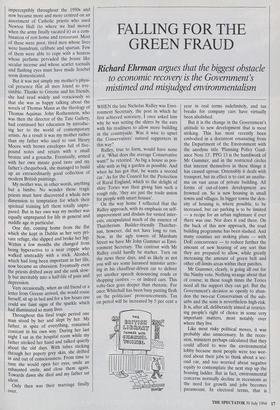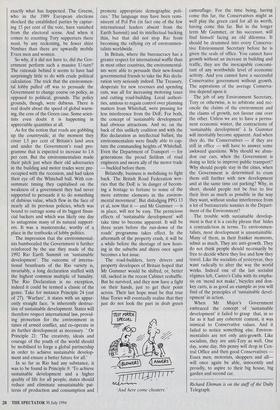FALLING FOR THE GREEN FRAUD
Richard Ehrman argues that the biggest obstacle
to economic recovery is the Government's mistimed and misjudged environmentalism
WHEN the late Nicholas Ridley was Envi- ronment Secretary, the post in which he first achieved notoriety, I once asked him why he was setting the shires by the ears with his readiness to allow more building in the countryside. Was it wise to upset the Conservatives' natural supporters in this way?
Ridley, true to form, would have none of it. 'What does the average Conservative want?' he retorted. 'As big a house as pos- sible with as big a garden as possible. And when he has got that, he wants a second car.' As for the Council for the Protection of Rural England, which to the delight of shire Tories was then giving him such a rough ride, 'they are just the trade union for people with smart houses'. On the way home I reflected that the Ridley approach, with its emphasis on self- improvement and disdain for vested inter- ests, encapsulated much of the essence of Thatcherism. Builder-friendly Thatcher- ism, however, did not have long to run. Now, in the ugly towers of Marsham Street we have Mr John Gummer as Envi- ronment Secretary. The contrast with Mr Ridley could hardly be starker. Turn on the news these days, and as likely as not you will see some harassed minister arriv- ing in his chauffeur-driven car to deliver yet another speech denouncing roads or shopping centres — or indeed cars. This volte-face goes deeper than rhetoric. For once Whitehall has been busy putting flesh on the politicians' pronouncements. Tax on petrol will be increased by 5 per cent a year in real terms indefinitely, and tax breaks for company cars have virtually been abolished.
But it is the change in the Government's attitude to new development that is most striking. This has most recently been embodied in a document emanating from the Department of the Environment with the anodyne title 'Planning Policy Guid- ance Note 13'. PPG 13 is the handiwork of Mr Gummer, and in the restricted circles that interest themselves in these things it has caused uproar. Ostensibly it deals with transport, but its effect is to cast an anathe- ma on vast areas of private building. All forms of out-of-town development are frowned on. So is new housing in small towns and villages. In bigger towns the den- sity of housing is, where possible, to be increased, but car parking is to be limited — a recipe for an urban nightmare if ever there was one. Nor does it end there. On the back of this new approach, the road building programme has been slashed. And many counties are making plans — with DoE concurrence — to reduce further the amount of new housing of any sort that they are prepared to allow, while greatly increasing the amount of green belt and other off-limits areas within their patches.
Mr Gummer, clearly, is going all out for the Nimby vote. Nothing strange about that of course; in these tough times the Tories need all the support they can get. But the Government's decision so openly to aban- don the two-car Conservatism of the sub- urbs and the semi is nevertheless high-risk. It is, after all, deliberately aimed at restrict- ing people's right of choice in some very important matters, most notably over where they live.
Like most risky political moves, it was probably also unnecessary. In the reces- sion, ministers perhaps calculated that they could afford to woo the environmental lobby because most people were too wor- ried about their jobs to think about a sec- ond car, and too worried about negative equity to contemplate the next step up the housing ladder. But in fact, environmental concerns normally decline in recessions as the need for growth and jobs becomes paramount. In electoral terms, that is exactly what has happened. The Greens, who in the 1989 European elections shocked the established parties by captur- ing 15 per cent of the vote, have vanished from the electoral scene. And when it comes to counting Tory supporters there must, by any reckoning, be fewer shire Nimbies than there are upwardly mobile Essex men and women.
So why, if it did not have to, did the Gov- ernment perform such a massive U-turn? The rationale behind it seems to have had surprisingly little to do with crude political calculation. The trick that the environmen- tal lobby pulled off was to persuade the Government to change course on policy, as opposed to political, grounds. The policy grounds, though, were dubious. There is real doubt about the speed of global warm- ing, the core of the Green case. Some scien- tists even doubt it is happening in appreciable quantities at all.
As for the notion that roads are gobbling up the countryside, at the moment they cover 1.5 per cent of Britain's land area and under the Government's road pro- gramme that is expected to increase to 1.6 per cent. But the environmentalists made their pitch just when their old adversaries in the building and motor trades were pre- occupied with the recession, and had taken their eye off the Whitehall ball. With con- summate timing they capitalised on the weakness of a government they had never supported to persuade it to do something of dubious value, which flew in the face of nearly all its previous policies, which was bound to outrage some of its biggest finan- cial backers and which was likely one day to antagonise many of its natural support- ers. It was a masterstroke, worthy of a place in the textbooks of lobby politics.
The impression that the environmental- ists bamboozled the Government is further reinforced by the use they made of the 1992 Rio Earth Summit on 'sustainable development'. The outcome of interna- tional beanfeasts of the Rio variety is, invariably, a long declaration stuffed with the highest common multiple of banality. The Rio Declaration is no exception, indeed it could be termed a classic of the genre. Take for instance Principle 24 (out of 27). 'Warfare', it states with an appar- ently straight face, 'is inherently destruc- tive of sustainable development. States will therefore respect international law, provid- ing protection for the environment in times of armed conflict, and co-operate in its further development as necessary. ' Or Principle 21: 'The creativity, ideals and courage of the youth of the world should be mobilised to forge a global partnership in order to achieve sustainable develop- ment and ensure a better future for all.'
In so far as Rio had any substance, it was to be found in Principle 8: 'To achieve sustainable development and a higher quality of life for all people, states should reduce and eliminate unsustainable pat- terns of production and consumption and promote appropriate demographic poli- cies.' The language may have been remi- niscent of Pol Pot (in fact one of the few international leaders absent from the Earth Summit) and its intellectual backing thin, but that did not stop Rio from becoming the rallying cry of environmen- talists worldwide.
In Britain, where the bureaucracy has a greater respect for international waffle than in most other countries, the environmental- ists were able to persuade their new-found governmental friends to take the Rio decla- ration very seriously indeed. The Treasury, desperate for new revenues and spending cuts, was all for increasing motoring taxes and cutting road-building. Local authori- ties, anxious to regain control over planning matters from Whitehall, were pressing for less interference from the DoE. For both, the concept of 'sustainable development' had obvious attractions. And so, on the back of this unlikely coalition and with the Rio declaration as intellectual ballast, the environmentalists were finally able to cap- ture the commanding heights of Whitehall. Even the Department of Transport — for generations the proud fiefdom of road engineers and sworn ally of the motor trade — buckled before them.
Belatedly, business is mobilising to fight back. The British Road Federation wor- ries that the DoE is 'in danger of becom- ing a hostage to fortune to some of the more extreme elements in the environ- mental movement'. But dislodging PPG 13 et al, now that it — and Mr Gummer — is in place, will not be easy. The pernicious effects of 'sustainable development' will take time to become apparent. It will be three years before the run-down of the roads' programme takes effect. In the aftermath of the property crash, it will be a while before the shortage of new hous- ing in the suburbs and shires once again becomes a hot issue.
The road-builders, lorry drivers and property developers of Britain hoped that Mr Gummer would be shifted, or, better till, sacked in the recent Cabinet reshuffle. But he survived, and they now have a fight on their hands, just to get their point across. Their last hope must be that true blue Tories will eventually realise that they just do not look the part in drab green 'And here come cheaters.' camouflage. For the time being, having come this far, the Conservatives might as well play the green card for all its worth, having come this far. But in the longer term Mr Gummer, or his successor, will find himself facing an old dilemma. It should be drummed into every Conserva- tive Environment Secretary before he is given the seals of office. You cannot have growth without an increase in building and traffic, they are the inescapable concomi- tant of any worthwhile level of economic activity. And you cannot have a successful Conservative government without growth. The aspirations of the average Conserva- tive depend upon it.
The job of any Environment Secretary, Tory or otherwise, is to arbitrate and rec- oncile the claims of the environment and the claims of growth, not favour one over the other. Unless we are to have a perma- nent economic winter, the contractions of `sustainable development' a la Gummer will inevitably become apparent. And when they do, the Conservatives — if they are still in office — will have to answer some awkward questions. Why should we aban- don our cars, when the Government is doing so little to improve public transport? Why should people stay in the cities, when the Government is determined to cram them still further with new development and at the same time cut parking? Why, in short, should people not be free to live their lives as much as possible in the way they want, without undue interference from a lot of bureaucratic nannies in the Depart- ment of the Environment?
The trouble with sustainable develop- ment is that it is a catchy phrase that hides a contradiction in terms. To environmen- talists, most development is unsustainable. Many of them, in their franker moments, admit as much. They are anti-growth. They do not think people should necessarily be free to decide where they live and how they travel. Like the socialists of yesteryear, they want radically to alter the way the world works. Indeed one of the last socialist regimes left, Castro's Cuba with its empha- sis on 'mend not make', bicycles and don- key carts, is as good an example as you will find of the principles of 'sustainable devel- opment' in action.
When Mr Major's Government embraced the concept of 'sustainable development' it failed to grasp that, in so far as it had any coherent content, it was inimical to Conservative values. And it failed to notice something else. Environ- mentalists are not only anti-growth. Like socialists, they are anti-Tory as well. One day, some day, this penny will drop in Cen- tral Office and then good Conservatives Essex men, motorists, shoppers and all— will once again be able, innocently and proudly, to aspire to their big house, big garden and second car.
Richard Ehrman is on the staff of the Daily Telegraph.



















































 Previous page
Previous page